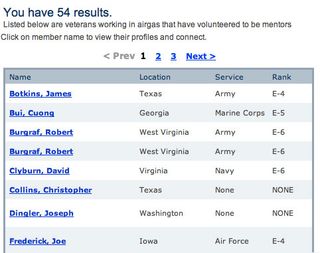Last week, I started a discussion concerning the noteworthy
desire many real estate companies have to hire ex-military individuals. There are some significant obstacles that
make this process a challenge, and very few real estate companies have been
successful in this endeavor. If you
didn’t catch the previous discussion, you may need some background to
understand today’s WorkPuzzle.
While real estate companies have not been overly successful
in hiring veterans, there are some other industries that have cracked the
code. For example, insurance companies
and financial services companies have demonstrated success at transitioning
military personnel into sales positions.
The compensation model for real estate agents (full commission
from day one) is a “deal breaker” for most individuals leaving the
military. Other industries have overcome
this hurdle by offering “commission draws” or startup compensation packages,
but real estate companies have not embraced this practice.
So, are we at an impasse?
Perhaps. However, I’d like to
suggest you consider one more example of an industry that has been successful
at hiring veterans—the franchise industry.
This may come as a surprise, but some franchises have been remarkably
successful at attracting and “hiring” ex-military individuals. This topic was recently identified as one of
the top small business trends in the country.
Also, Michelle Obama recently promoted the marketing of franchises to
veterans.
 Why are franchises so interested in hiring veterans? For the same reasons you’re interested in
Why are franchises so interested in hiring veterans? For the same reasons you’re interested in
hiring them—they believe they are uniquely qualified to be successful in the
role as a franchise owner.
There is much to read on this topic (starting with the
articles cited above), and I hope I have peaked your interest on investigating
this connection on your own. As I’ve
studied this connection, I’ve noticed three things that franchises do well in
attracting veterans.
The Cookbook Mentality. Franchises are famous for promoting the idea
that success is the result of closely following a proven system developed by
the franchisor. “If you meticulously
follow these 50 steps, you will be successful,” is the franchise promise.
Military veterans connect with this line of reasoning
because it is very similar to what they’ve experienced in the military. A soldier is not expected to develop his or her
own plan for shooting a missile at a target.
That would be crazy. Instead,
they are expected to follow a detailed specification that, if executed correctly,
will guarantee the missile will hit its target.
If you want to be more successful at hiring ex-military
individuals, develop your own “cookbook,” and then promote the idea by following the step-by-step procedure that will guarantee success. Be ready to demonstrate how other veterans have stepped into this position, followed the cookbook, and experienced success according to the plan.
The Expectation of Camaraderie. Some of the best memories I have from serving
in the military center around shared experiences. The solidarity in purpose allows
relationships to flourish in a unique manner.
When people leave the military, they miss this feeling and often seek-out
other individuals with military backgrounds with which to reconnect.
 Franchise companies have noticed this pattern and use it to
Franchise companies have noticed this pattern and use it to
market to veterans. Research this topic
and you’ll quickly notice that franchise aggregators make a big deal of
highlighting the number of veterans who are successful franchise owners.
It doesn’t stop there.
Some franchise companies highlight support and mentoring groups for
ex-military personnel. These companies
are purposely attempting to duplicate the camaraderie the service members felt
when they were in the military.
Convincing a person that he/she will be successful in a new role
is an important selling point, but convincing a person that they belong there is a
powerful attraction. Notice the company
highlighted in the graphic—this company produces a searchable list of names,
branch of service, rank when they left the military, and location. A candidate who goes on this company’s career
site quickly sees how he or she could potentially fit into this community of
veterans.
The Path to Financing. As you may know, buying into a franchise is
expensive. Start-up costs for most franchises are $50,000 and up. There are very few veterans (or normal
citizens) who are able to afford this expense as a lump sum. Every franchise
company has to deal with the issue of providing financing options to potential franchisees.
Real estate companies are fortunate that their startup fees
for agents are not this substantial.
However, to a military member with a family living paycheck-to-paycheck,
even $5,000 can feel like an insurmountable hurdle. You’re in the same boat as the franchise
company.
Franchise companies have become very creative on this
issue. Options include commercial loans,
SBA loans, collateral-backed bank loans, crowd-sourced funding, angel investors,
third-party lenders, etc. The Wall Street Journal recently reported that
the Department of Veterans Affairs runs a program called Patriot Express (it is
called this because of the fast approval times for the loans) that makes business loans
up to $500,000 to active-duty military preparing to transition to civilian
life, as well as to spouses and survivors of veterans.
When a veteran makes contact with a franchise company, they
are ready and well-prepared for the financing question. They assume the candidate will not be able to
afford the start-up costs, and they put time and effort into helping them solve
the financing issue.
To successfully hire veterans, real estate companies need to
adopt the same posture. The financing
issue needs to be “front and center” and addressed early in the hiring process.
To someone leaving the military, there is not much to talk
about until this issue is addressed and solved.
Summary
I had one of our readers write me earlier this week and
mention (after reading the previous WorkPuzzle) she was looking forward to
hearing about my “magic bullet” for hiring veterans.
I wish there was a magic bullet. Unfortunately, hiring veterans takes
strategic focus and a lot of hard work.
Most real estate companies have not boiled down their
process to the franchise “cookbook” level.
Often new agents are expected to be self-directed and creative in how
they build their businesses. This is a
tough transition for most veterans to make.
Most real estate companies do not have groups of veterans
working in the company who are ready and willing to provide the camaraderie
that makes an ex-military person feel at home. This takes time, effort, and
focus to build.
Most real estate companies have not thought through the
financing challenges that veterans face in making a transition to the real
estate industry. On this issue,
franchises are very proactive. They
know the challenges the candidates face and they’re ready and able provide
solutions.
If your company is ready and willing to address these
issues, you can be successful at hiring veterans. Franchise companies have
proven it can be done. Real estate companies could potentially have even greater success because the financial barriers to entry are not as significant as franchises.
Join the WorkPuzzle Discussion at the Tidemark Online Community (TMOC)
Engage in the WorkPuzzle discussion by joining the TMOC private social network. Commenting on a public blog like WorkPuzzle can be a little intimidating, so why not join the discussion inside the privacy of the TMOC discussion group?
By joining TMOC, you'll get to see who else is in the group and your comments will only be seen by those whom you trust. Joining TMOC is quick, easy, and free (no kidding…this takes less than 2 minutes). To get started, click here.
Already of a member of TMOC? If so, join the WorkPuzzle Dialog Group by clicking on the WorkPuzzle Group icon on the left side of your TMOC homepage. Questions? Email the WorkPuzzle editor (workpuzzle@hiringcenter.net) and we'll walk through the process.
 Editor's Note: This article was written by Ben Hess. Ben is the Founding Partner and Managing Director of Tidemark, Inc. and a regular contributor to WorkPuzzle.
Editor's Note: This article was written by Ben Hess. Ben is the Founding Partner and Managing Director of Tidemark, Inc. and a regular contributor to WorkPuzzle.















